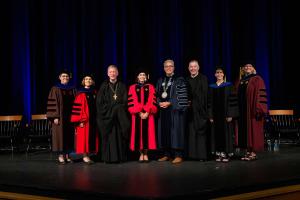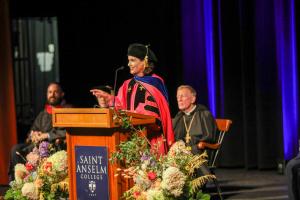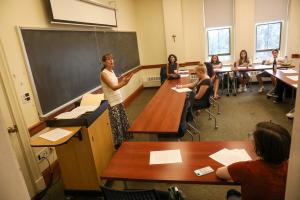This year, Saint Anselm marks this delineating moment in its history with a series of special events and programs engaging the entire campus community and planned by a committee dedicated to commemorating the anniversary.
“In some ways, it is hard to imagine a time when Saint Anselm was not a co-educational institution,” said President Joseph A. Favazza, Ph.D. at the convocation, the first event of the year. “When reflecting on that decision, it is so clear to me how the presence of women on campus has only strengthened the mission of the college.”
Dr. Favazza pointed to the contributions of women in the 1950s, from Ruth Bagley and Margaret Amsbury hired to lead the nursing program to Barbara Stahl and Ann Sullivan hired to teach in the biology department.

Beyond the faculty, women who contributed to the college’s mission include Norma Creaghe as head librarian, Isabelle Gadbois, the first female member of the advisory board, and, of course, Denise Askin, who was appointed as the first woman in administrative leadership as executive vice president in 1985.
“Each moment, each individual, a new thread woven inextricably into the fabric of our community, our history, our identity,” said Dr. Favazza.
Vice President for Academic Affairs Sheila Liotta, Ph.D., also shared college history, touching upon significant dates such as the Benedictine community’s vote to admit women in November of 1973 and the enrollment of 26 women resident and commuter students to all programs of the college in late August of 1974.
“We owe a debt of gratitude to those 26 pioneering young women who climbed the hill with confidence and tenacity,” said Liotta.
In the spirit of reflection, alumna Emily Orlando, Ph.D. ’91, a professor of English and the E. Gerald Corrigan Chair in the Humanities and Social Sciences at Fairfield University in Fairfield, Conn., gave the convocation address, “Closer We Are to Fine,” speaking about her own experiences as a Saint Anselm student in the late 1980s and early 1990s and drawing on her expertise in women and literature.
Orlando is an internationally recognized scholar on Edith Wharton, a female author who, as Orlando reminded her audience, “was not supposed to be a professional writer but on the contrary was born into a family whose women were raised to be decorative ornaments and/or society hostesses.” Having studied Wharton’s literature and life extensively, Orlando is particularly positioned to draw comparisons between Wharton’s success and those of women throughout the last 100 years.
In remarks full of pop culture references, from Greta Gerwig’s recent blockbuster hit “Barbie” to Taylor Swift’s 1989 album and pop hit “Shake It Off” to quotes by the band U2, Orlando described her experiences as a Generation-X college woman, citing the Indigo Girls’ “Closer to Fine” song released in 1989 as an anthem of sorts.
She first called Saint Anselm College home in the fall of 1987, only 13 years after women were first admitted to all undergraduate programs. In her time on campus, she had three tenured professors who were women, including Denise Askin who taught what was for Orlando, a “life-changing course in American Writers” and was the reason that Orlando focused her Ph.D. on American Literature.
“The curriculum at Saint Anselm lit a fire in me that has never dwindled,” she said. “That’s precisely what the humanities will do: promise us a lifelong love of learning.”
She continued explaining the important role Saint Anselm’s liberal arts curriculum and faculty played in her life and career. “Here’s the thing: Saint Anselm taught me how to think critically and how to be humane. It introduced me to the life of the mind. The four semesters of the humanities seminar made me comfort- able with my own voice. The curriculum taught me how to represent myself well in person, on the page, and now, online.”

She added, “What good fortune to find ourselves at a place that enables us to pursue our appetites for ‘intellectual curiosity,’ to cultivate our interests in ‘big things,’ and to be persons for others who are connected to something bigger than ourselves.”
Orlando advised students to find their own passions: “Look in your heart and find the thing you love. Then, as the poet Emily Dickinson implores, dwell in all its possibilities.”
She concluded by advocating for “faith seeking understanding,” striving for “closer to fine,” and proposing: “Might we be incorrigible in our life-loving and take a page out of Denise Askin’s book. As a tribute to the legacy of that ‘portrait of human greatness,’ let us remind ourselves, habitually, that anything good is possible.”
Orlando is the author of the award-winning book, Edith Wharton and the Visual Arts (University of Alabama Press, 2007). She also is co-editor of the book, Edith Wharton and Cosmopolitanism (University Press of Florida, 2016), and has published widely in several scholarly journals and essay collections. She is a recent president of the international Edith Wharton Society and remains an active member. She edited The Bloomsbury Handbook to Edith Wharton, (Bloomsbury Academic, 2022), which features top scholars in her field from around the globe.
In addition to Orlando’s speech, convocation was also an opportunity to highlight the profound impact Denise Askin had on generations of Anselmians. Askin passed away June 6, 2023, after a long struggle with ALS. In addition to her role as EVP, she was a member of the English department and one of the first women to be granted tenure at Saint Anselm College. She served as a member of the board of trustees from 2009 to 2020. In 2022, she was elected as a trustee emerita.
To honor Askin’s memory, the college announced the establishment of the Dr. Denise Askin Faculty Fellowship. Each year, the fellowship, which is administered through the Father Peter Center for Teaching Excellence (CTE), will provide two to three faculty with the support, time, and resources they need to re-envision their coursework and pedagogy with a focus on ensuring equity, inclusion, and belonging for diverse students. Education Professor Dianna Terrell, Ph.D., one of the CTE co-chairs, announced the fellowship at convocation.
“I am honored to reveal more evidence to illustrate Dr. Askin’s continuing ability to light the way for the academic community at Saint Anselm College in opening literal doors, and in opening minds,” said Professor Terrell. “In this way, we appreciate Dr. Denise Askin’s ability to continue to hold us to a high bar.”
The committee planning this year’s anniversary celebrations is led by Fr. Benet Phillips, O.S.B. ’87, director alumni relations and advancement programming, and Christine Gustafson, professor of politics and special assistant to the vice president for academic affairs. Additional events and programs will be announced in the coming months. For more information on upcoming events, visit www.anselm.edu/womens-50.
Studying Influential Women
Alumna Emily Orlando, Ph.D. ’91, a professor of English at Fairfield University in Fairfield, Conn., and Saint Anselm English Department Professor Ann Holbrook, Ph.D., shared their expertise on the history of feminist literature through a co-taught class offered to Saint Anselm English students. Orlando was on campus as speaker for the academic convocation celebrating 50 years of women’s education at Saint Anselm College.
The class focused on the evolution of feminism through English literature within the 19th and 20th centuries. This collaborative class outlined the complexity and challenges many female authors faced during different historical times, with the renowned works of Edith Wharton and Virginia Woolf featured.

Holbrook, academic subcommittee chair for the Women’s 50th Committee, who specializes in teaching 19th- and 20th-century British literature, shared that “we have to understand feminism in its context and not reduce it to labels."
For Orlando, returning to the Hilltop as a teacher was a fulfilling experience. “It was, of course, a great delight to teach Virginia Woolf with the incomparable Dr. Ann Holbrook, who went out of her way to welcome me,” she says. “As I said in my convocation address, quoting 1980s Bono, the return to Saint Anselm College really was ‘a sort of homecoming.’ In the Alumni Hall classroom, I found the level of engagement and intellectual inquiry to be quite similar to what I see at Fairfield University: students who are smart, thoughtful, serious, and committed to social justice, equity, and inclusion.”
Orlando is the author of the award- winning book, Edith Wharton and the Visual Arts (Bloomsbury Publishing, 2022). She is also co-editor of the book, Edith Wharton and Cosmopolitanism (University of Alabama Press, 2007), and has published widely in several scholarly journals and essay collections. She is a recent president of the international Edith Wharton Society and remains an active member. Orlando edited The Bloomsbury Handbook to Edith Wharton (Bloomsbury Academic, 2022), which features top scholars in her field from around the globe. She is currently editing a reader-friendly edition of Edith Wharton’s first book, The Decoration of Houses, co-written with the architect Ogden Codman, Jr. and published in 1897.
Since joining the Fairfield University faculty in 2007, she has taught 19th- and 20th-century literature and courses on women writers, served as the director or co-director of the Women, Gender & Sexuality Studies Program, and is the department’s internship coordinator.
Orlando has been recognized with awards for her teaching and mentoring, including Fairfield’s 2019 College of Arts and Sciences Award for Distinguished Advising and Mentoring. In 2019, students in the honors program voted her “Best Professor” for her honors seminar in Victorian literature and culture. She has a Ph.D. in English from the University of Maryland.
—Ella Gordon ’25
